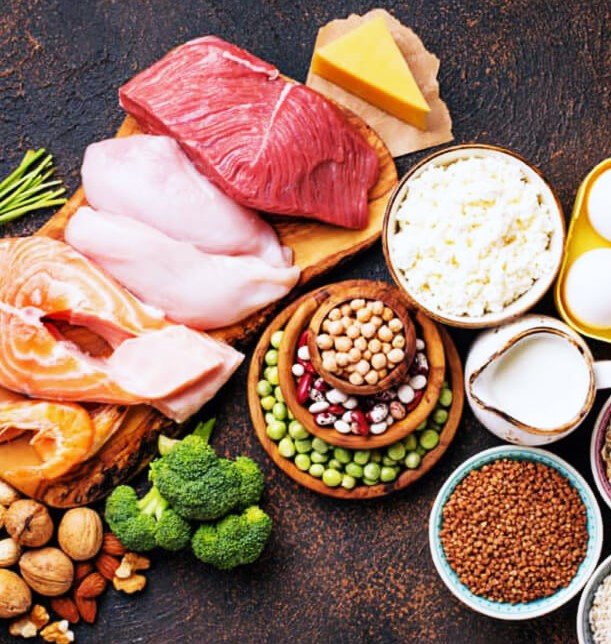How much protein do I need | Is it better to get protein from animal or plant sources?
How much protein do I need
The typical recommendation for protein per day is 0.8 to 1.0 grams per kilogram of body weight1. To calculate your daily protein needs, you can follow these steps:

Convert your weight to kilograms: If you know your weight in pounds, divide it by 2.205 to get your weight in kilograms.
Multiply your weight in kilograms by 0.8 or 1.0: This will give you the recommended range of protein intake. For example, if you weigh 170 pounds (about 77 kilograms), the minimum recommended protein intake would be approximately 61.6 grams per day.
Remember that individual protein needs can vary based on factors like age, activity level, and health status. It’s always a good idea to consult with a registered dietitian or healthcare professional to determine the right amount of protein for your specific needs. 💪
What are good sources of protein?
Certainly! Here are 16 delicious foods that are high in protein:
Eggs: Whole eggs are easy to absorb and provide vitamins, minerals, healthy fats, and antioxidants. One large egg provides 6.3 grams of protein1.
Almonds: These tree nuts are rich in essential nutrients and plant-based protein. One ounce of almonds provides 6 grams of protein1.
Chicken breast: Excellent for increasing protein intake, chicken breast also provides B vitamins, zinc, and selenium. Half of a chicken breast (86 grams) offers 26.7 grams of protein1.
Cottage cheese: Low in fat and calories, cottage cheese is high in protein and rich in calcium, phosphorus, and other nutrients. One cup of cottage cheese provides 28 grams of protein1.
Other protein-rich foods include Greek yogurt, lentils, lean beef, fish, quinoa, and more. Remember to choose a variety of protein sources to meet your nutritional needs!
How can I incorporate more protein into my diet?
Certainly! Incorporating more protein into your diet is essential for muscle repair, growth, and overall health. Here are some practical tips to boost your protein intake:
Prioritize Protein-Rich Foods: Include protein sources in every meal. Examples include chicken, fish, eggs, tofu, legumes, and dairy products.
Start Your Day Right: Begin your day with a protein-rich breakfast. Options include scrambled eggs, Greek yogurt, or a protein smoothie.
Snack Smart: Opt for protein-packed snacks like almonds, cottage cheese, or beef jerky. These keep you full and satisfied between meals.
Add Protein to Salads: Top your salads with grilled chicken, chickpeas, or quinoa for an extra protein punch.
Choose Whole Grains: Whole grains like quinoa, brown rice, and oats contain more protein than refined grains.
Include Beans and Lentils: These plant-based sources are not only high in protein but also rich in fiber and other nutrients.
Explore Protein Supplements: If needed, consider protein shakes or bars as convenient options.
Remember to balance protein intake with other nutrients and stay hydrated. Feel free to ask if you need more specific meal ideas
Is it better to get protein from animal or plant sources?
Both animal and plant sources of protein have their benefits, and the choice depends on individual preferences, dietary restrictions, and health goals. Let me break it down for you:
Animal Sources:
Complete Proteins: Animal-based proteins (such as meat, fish, eggs, and dairy) are considered “complete” proteins because they contain all essential amino acids in the right proportions. These amino acids are crucial for muscle repair, immune function, and overall health.
High Biological Value: Animal proteins have a high biological value, meaning they are efficiently absorbed and utilized by the body.
Rich in Vitamins and Minerals: Animal sources provide essential nutrients like vitamin B12, iron, zinc, and omega-3 fatty acids.
Plant Sources:
Incomplete Proteins: Most plant-based proteins (such as legumes, nuts, seeds, and grains) are “incomplete” proteins because they lack one or more essential amino acids. However, combining different plant sources can create a complete amino acid profile.
Fiber and Antioxidants: Plant proteins come with the added benefit of fiber, antioxidants, and phytonutrients. They promote digestive health and reduce the risk of chronic diseases.
Lower Saturated Fat: Plant-based proteins are generally lower in saturated fat compared to some animal sources.
Balancing Both:
Variety Matters: The best approach is to include a variety of protein sources. Combining animal and plant proteins ensures a diverse amino acid intake.
Personal Preference: Consider your taste preferences, ethical choices, and any dietary restrictions. Some people choose plant-based proteins for environmental reasons or to reduce their intake of saturated fat.
Remember that a balanced diet includes a mix of both animal and plant proteins. If you’re vegetarian or vegan, focus on combining different plant sources to meet your protein needs. Consult a registered dietitian to tailor your protein intake based on your specific requirements.